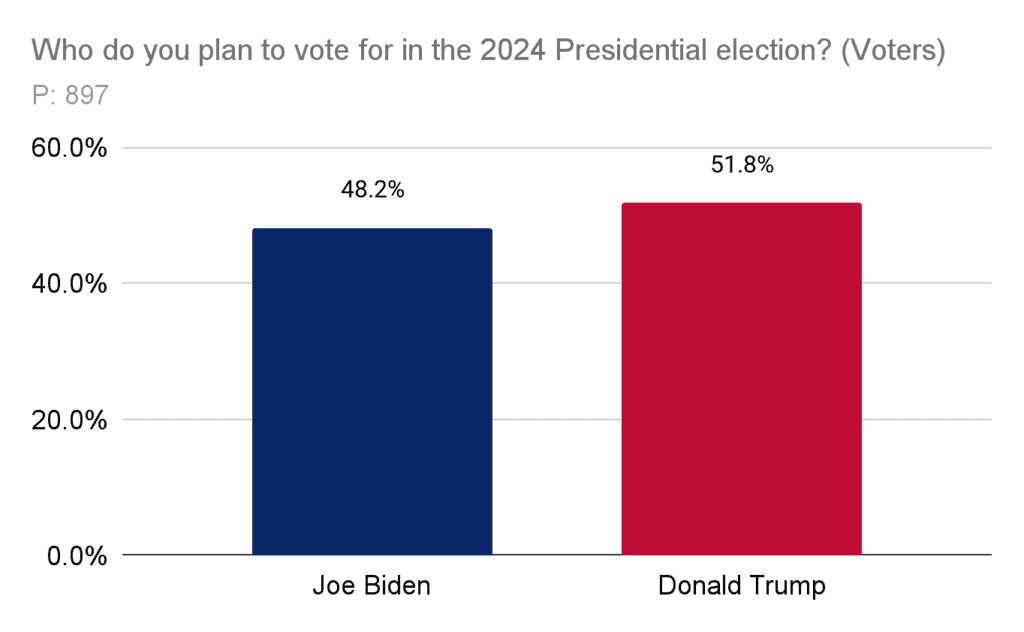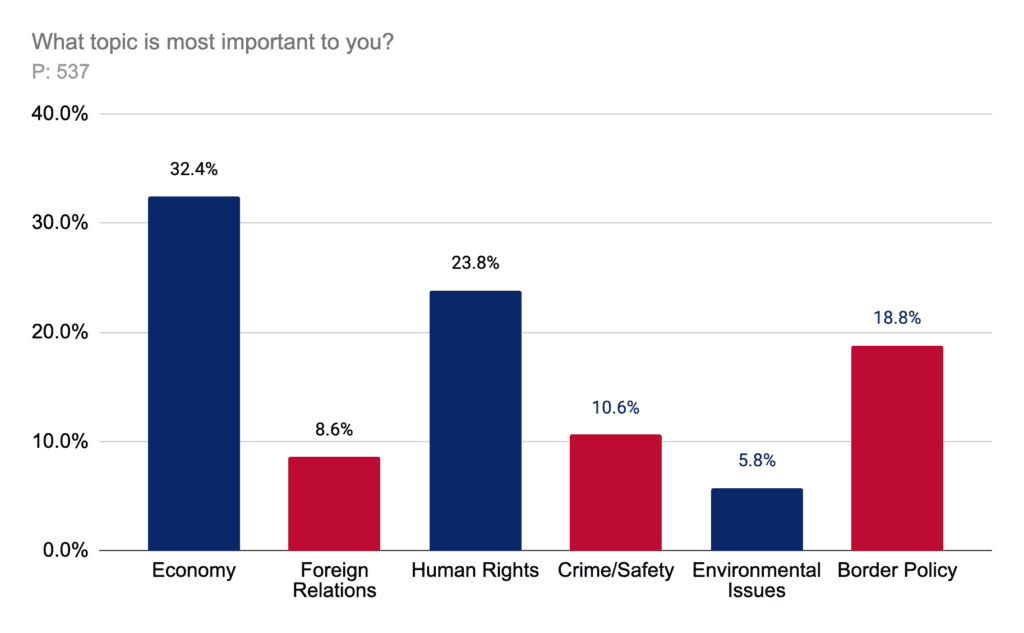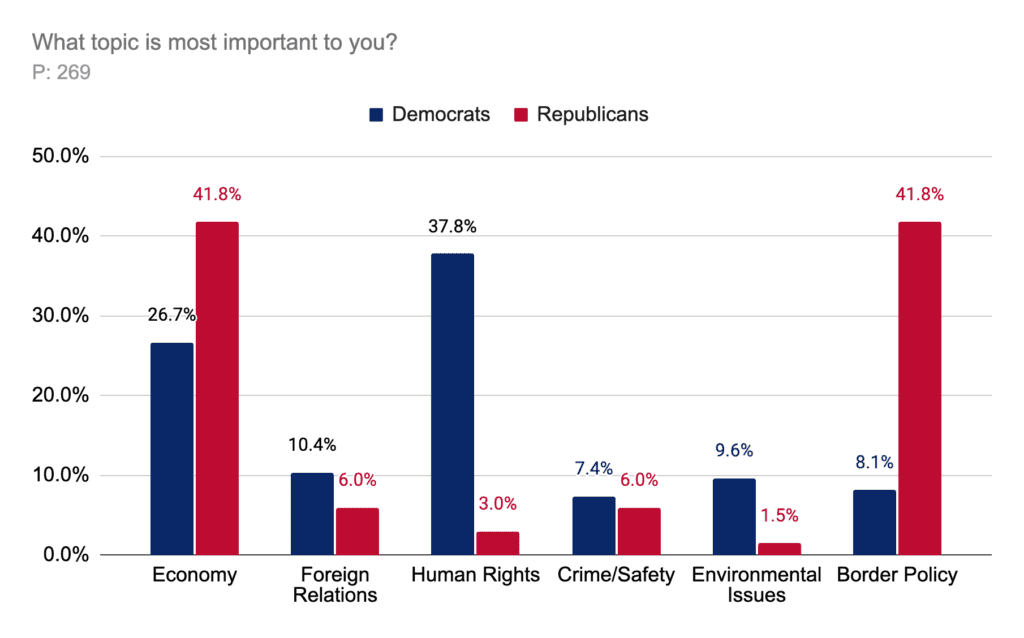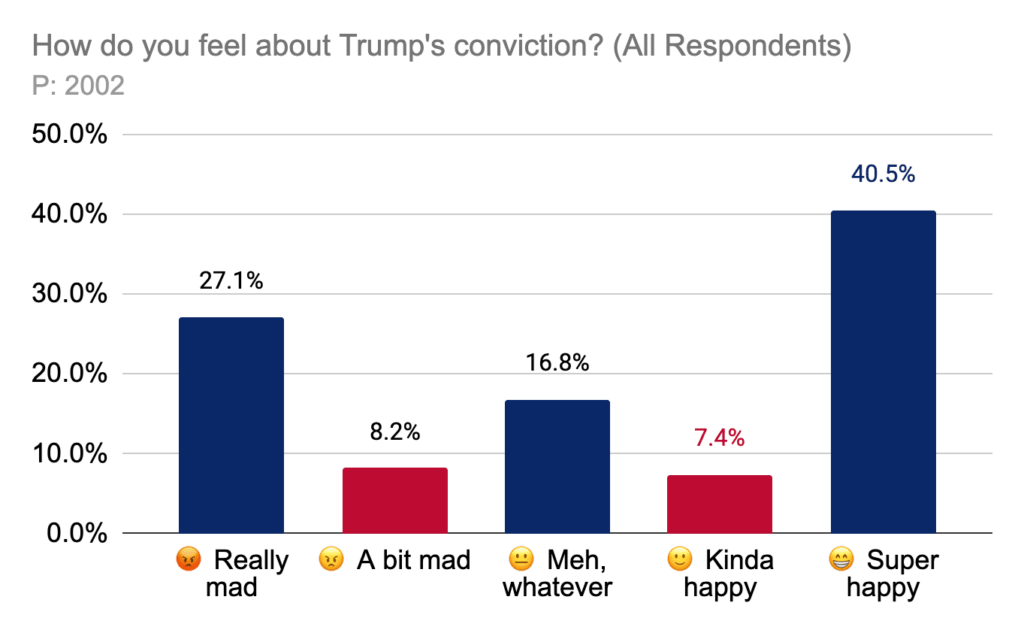Jun 27, 2024, 11:26am
Pulse on the 2024 Presidential Election, June 2024 - Pulse of the Presidency

We recently conducted a poll to gauge the sentiments of Americans regarding the upcoming 2024 Presidential election. We aimed to understand the key concerns, preferences, and expectations of the electorate, as the nation prepares for this pivotal event. This survey provides insights into the public's mood and priorities, offering a snapshot of the national pulse leading up to the election.
In the fast-paced and ever-evolving landscape of presidential races, it is crucial to continuously run polls to keep a finger on the pulse of public opinion. Polls provide valuable insights into voter preferences, track shifts in sentiment, and help campaigns adapt their strategies to changing dynamics. They offer a real-time snapshot of the political climate, enabling candidates and analysts to make informed decisions.
Unlike traditional polling methods, which often have a lag between data collection and analysis, Realtime Research provides immediate feedback. This capability allows for more agile responses to emerging trends and events, ensuring that the most current and accurate information is always at hand. With Realtime Research, stakeholders can stay ahead of the curve and navigate the complexities of presidential races with unprecedented precision.
Highlights
We recently conducted a poll to gauge the sentiments of Americans regarding the upcoming 2024 Presidential election. We aimed to understand the key concerns, preferences, and expectations of the electorate, as the nation prepares for this pivotal event. This survey provides insights into the public’s mood and priorities, offering a snapshot of the national pulse leading up to the election.
- We surveyed over 1,200 Americans.
- Among people who plan to vote in the 2024 Presidential election, 51.8% said they would vote for Donald Trump compared to 48.2% who said they would vote for Joe Biden.
- The biggest concern among people polled is the economy, with 32.4% of the vote.
- 78.1% of people surveyed said they supported a mandatory retirement age for politicians.
Results
Using our Realtime Research tool, we continuously poll Americans to track how their views evolve as Election Day approaches. In our latest survey of 1,236 people, we aimed to gauge current public sentiment. The first question we asked was, “Who do you plan to vote for in the 2024 Presidential Election?”

The results indicate a close race between Donald Trump and Joe Biden, with 51.8% of respondents favoring Trump and 48.2% supporting Biden. This narrow margin underscores the intense competition and highlights the significance of the upcoming months leading to the election. The outcome remains uncertain, emphasizing the importance of the candidates’ efforts in the final stretch.

When asked about their biggest concern, respondents provided the following breakdown: 32.4% cited the Economy as most important, followed by Human Rights at 23.8%, Border Policy at 18.8%, Crime/Safety at 10.6%, Foreign Relations at 8.6%, and Environmental Issues at 5.8%.

When we look at it broken down by political affiliation, the data paints a slightly different picture.

Among Republicans surveyed, the economy emerges as a top concern, with a significant 41.8% emphasizing its importance. This focus underscores an emphasis on fiscal policies, job creation, and economic growth within the party’s agenda. Parallel to economic concerns is border policy, also at 41.8%, reflecting deep-seated concerns over immigration, national security, and border control.
Conversely, Democrats display a different set of priorities. Human rights stand out prominently, with a significant 37.8% of respondents highlighting its importance. This focus likely encompasses issues such as civil liberties, racial and gender equality, and social justice reforms, reflecting strong advocacy within the Democratic base. Economic concerns, while still prominent, hold a slightly lesser but notable share at 26.7%.
Next, we wanted to understand how people feel about a mandatory retirement age for politicians.
Mandatory retirement ages have sparked considerable debate and scrutiny in political circles worldwide. In a survey we conducted in August 2023, 65% of respondents expressed support for such a measure. Fast forward to our latest survey, and that support has surged to an impressive 78%.

The sharp rise in support from 65% to 78% indicates a growing consensus among the public regarding the necessity of introducing age limits in political leadership. This trend suggests a shifting perception towards the benefits of rejuvenating political representation and maintaining robust governance.
The increase prompts us to consider the underlying reasons driving this shift. Is it primarily driven by a desire for fresh perspectives in governance, or is it more about safeguarding against potential cognitive decline among aging politicians?
Ultimately, these poll results highlight not just what voters care about, but also where each party may focus their messaging and policy platforms to sway undecided voters and mobilize their respective bases. As the political climate evolves, these priorities will continue to shape the discourse and decisions leading up to Election Day. Understanding these nuances is key to crafting effective strategies that resonate with voters across the political spectrum.
The Process
In today’s dynamic political landscape, Realtime Research has become indispensable for comprehending public sentiment and electoral behavior. By capturing subtle nuances in emotions and decoding voting intentions, these tools provide invaluable insights into the intricate workings of contemporary politics. Utilizing Realtime insights, stakeholders can navigate through uncertain terrain with clarity, adaptability, and foresight, enabling informed decision-making in an evolving world.
What We Asked
- Who do you plan to vote for in the 2024 Presidential Election?
- What topic is most important to you?
- Should there be mandatory retirement age for politicians?
- How satisfied are you with President Joe Biden?
- Why aren’t you voting? (People who answered Q1 “Not voting”)
- Who did you vote for in the 2020 Presidential election?
- What political party do you most align with?
Discussion
As we edge closer to Election Day 2024, the race for the presidency is heating up. Currently Trump holds a slight lead with 51.8% of respondents favoring him, while Biden closely follows with 48.2%. This razor-thin margin underscores the intensity and significance of the upcoming months in shaping the future leadership of our nation.
In such a closely contested race, both candidates must strategically leverage every opportunity to gain an edge.
Trump’s strategy will likely hinge on emphasizing his administration’s accomplishments and focusing on economic policies. With the economy ranking as a top concern among voters, Trump can highlight job creation, tax reforms, and efforts to stimulate economic growth. Additionally, rallying his base with strong messaging on immigration and national security could further solidify his support.
Biden’s path to victory may involve doubling down on his platform’s strengths, particularly on issues of human rights, healthcare, and social justice reforms. His campaign could emphasize his administration’s response to the COVID-19 pandemic and efforts toward healthcare expansion.
Engaging younger voters and progressives on environmental issues and education reforms could also bolster his appeal.
Throughout this pivotal period, Realtime Research will continue to monitor voter sentiment and electoral dynamics. By conducting ongoing surveys, we aim to provide up-to-the-minute insights into shifting public opinions and emerging trends. This data-driven approach equips stakeholders, from campaign strategists to policymakers, with the clarity and foresight needed to adapt their strategies in real-time.
As the election draws nearer, the competition will undoubtedly intensify. Both candidates will need to navigate complex issues, respond to evolving voter priorities, and effectively communicate their visions for the future. With Realtime Research tracking these developments, we are committed to providing the most accurate and timely information to help understand and shape this historic election. Stay tuned as we continue to uncover the dynamics that will define Election Day 2024.
Campaign Insights’ Realtime Polling surveys differ from traditional online surveys in that the questions are shown to the user on web pages in place of an ad. Unlike Google Surveys, which block access to content until the questions are answered, Realtime Polling surveys are optional, thus ensuring that participants are responding voluntarily.
